If you’re looking to ditch harsh chemicals from your cleaning routine, see how vinegar can become your new go-to cleaning aid. Learn all about cleaning with vinegar and my top tips for using vinegar to clean!
I have changed my cleaning habits over the last 2 years to avoid harsh chemicals. One thing I’ve learned is that vinegar is a wonderful natural cleaner. But, I realized that I’ve been remiss in giving tips on this site for using white vinegar for cleaning.
I’m changing that today with this list of my top 25 tips for naturally cleaning with vinegar!
Note: If you have missed any of our series, check out the ways to clean with:
And, don’t forget the rubbing alcohol!
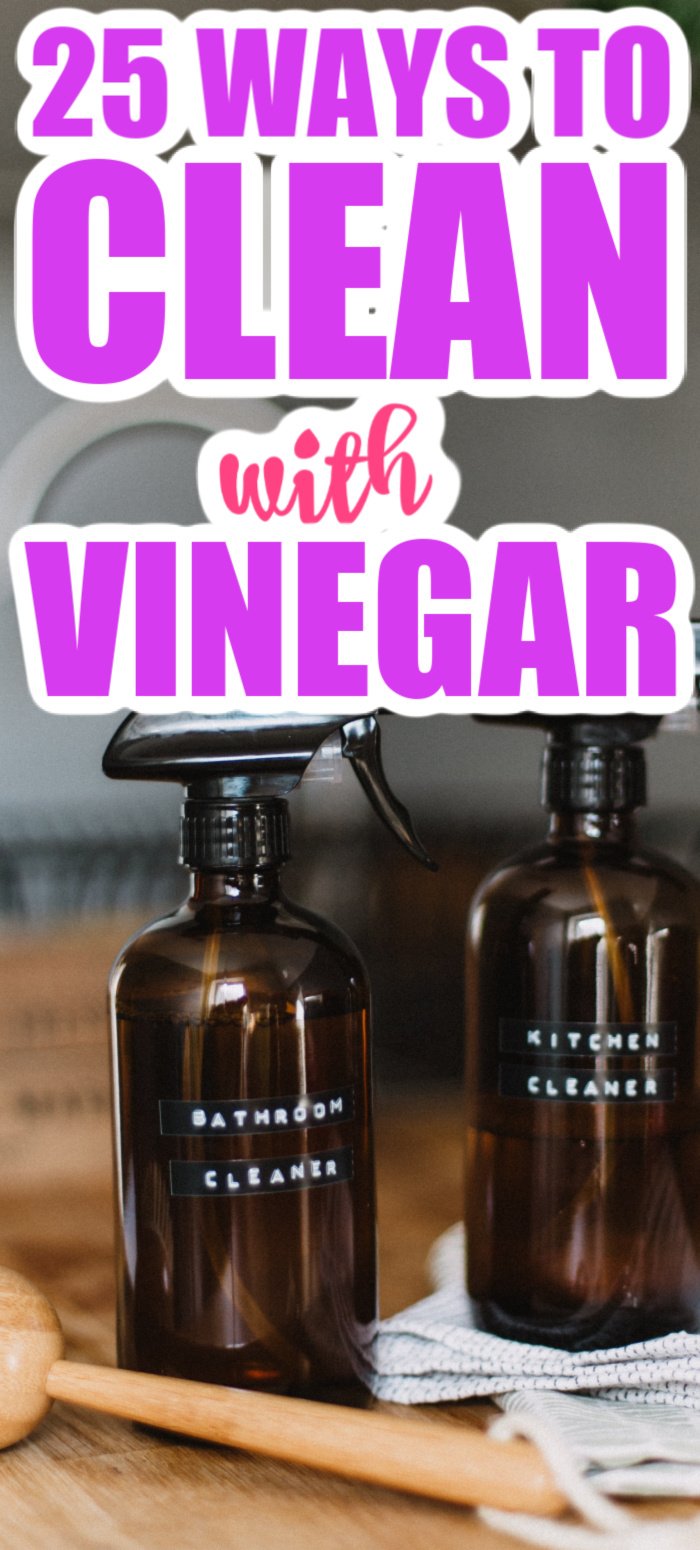
Is vinegar good for cleaning?
Before we get started, I want to provide a little background information.
White distilled vinegar is a natural bacteria and germ killer simply due to its acidity. It’s environmentally friendly, safe for animals and kids, and very economical. And, if all of that isn’t enough, vinegar is a natural odor eliminator!
All of this means that using white vinegar for cleaning is a natural fit for anyone looking to eliminate harsh chemicals from their home.

Heinz cleaning vinegar is 6% acidic, whereas regular vinegar is only 5% acidic. This makes it even BETTER for cleaning than other regular white distilled vinegar products.
Precautions For Cleaning With Vinegar
I recommend taking a couple of precautions when working with vinegar:
- Do not add vinegar directly to materials containing ammonia because doing so could produce harmful vapors.
- Never use white distilled vinegar on marble. The acid can damage the surface.
Pro Tip: Always test your surfaces in an inconspicuous area before cleaning with vinegar.
How To Clean With Vinegar: My Top 25 Tips
Now, let’s dive into my top 25 tips for green cleaning with vinegar!
Counter Tops
- Use a cleaning rag and vinegar to wipe down your countertops.
- I recommend taking a damp rag and wiping them down to remove the vinegar once they’re clean.
Drain Or Garbage Disposal
- Pour in 1 cup baking soda then one cup hot vinegar.
- Let sit for 5 minutes.
- Run hot water down the drain.
Note: Some garbage disposals do not react well to this cleaning method check all manufacturer instructions first.
Microwave
- Mix equal parts vinegar and water in a microwave-safe bowl.
- Bring it to a boil inside the microwave.
- Wipe clean!
Note: Heating vinegar in the microwave can cause an aroma that some people may not like. If you don’t like it, the good news is that it dissipates quickly!
Refrigerator
- Clean your fridge by wiping it down with a half-and-half solution of water and vinegar.
Dishwasher
- Pour a cup of vinegar inside an empty machine and run through a cycle.
Plastic Food Containers
- Wipe them down with a vinegar-dampened cloth to remove stains and smells.
Lunch Box
- Place a slice of bread that has been soaked in vinegar inside the lunchbox and leave it there overnight to remove odors.
Glass (such as a coffee pot)
- Remove the film from the inside by letting the vinegar sit in them for a few hours.
- Add a little rice or sand and shake vigorously to loosen stubborn stains.
- Repeat if necessary!
Mini Blinds
- Dip gloved fingers into a solution of equal parts vinegar and warm tap water.
- Run your fingers across both sides of each blind.
Tarnished Metal
- Make a paste with equal amounts of vinegar and table salt.
- Use a clean rag and dip it into the paste.
- Then, scrub the tarnished metal until it shines like new.
Grease
- Use a sponge soaked in vinegar and wipe away the grease.
Grill
- Spray a solution of half water and half vinegar on the cooking surface.
Sponges
- Place your sponges in just enough water to cover them.
- Then, add 1/4 cup vinegar.
- Let it soak overnight to kill all bacteria, mold, etc.
Grout
- Let full-strength vinegar sit on it for a few minutes and scrub your grout with an old toothbrush.
Germs
- Spray the area with full-strength vinegar then wipe clean with a damp cloth.
Soap Scum
- Wipe the area down with undiluted vinegar and then rinse.
Toilets
- Pour in a cup or more of vinegar and let it sit several hours or overnight.
- Scrub well with a toilet brush and flush.
Stale Odors
- Cleaning with vinegar doesn’t just mean killing germs!
- Remove odors by wiping down items with undiluted vinegar on a rag.
Wood
- Remove water rings with a solution of equal parts vinegar and vegetable oil.
- Rub along with the grain.
Scissors
- Clean off sticky residue with a cloth dipped in vinegar.
Odors
- Place a bowl of vinegar in the room overnight.
Hands
- Wipe your hands with vinegar to remove strong scents like onion and garlic, as well as stains from fruit juices.
Cutting Boards
- Wipe wooden boards down with vinegar to kill germs and bacteria.
Dusting
- Use spray bottle filled with half vinegar, half water and lightly spray a rag to dust all surfaces.
Mildew
Cleaning with vinegar can also be done preemptively!
- Spray shower walls and shower curtain with half vinegar and half water to help prevent mildew.
Does using vinegar to clean work well?
Now that I’ve given you all my best tips, I want to take it a step further and add a visual demonstration to prove its effectiveness.
As a little demonstration, I decided to show y’all the power of vinegar in my kitchen. I have tile countertops that I hate but that I have to live with.
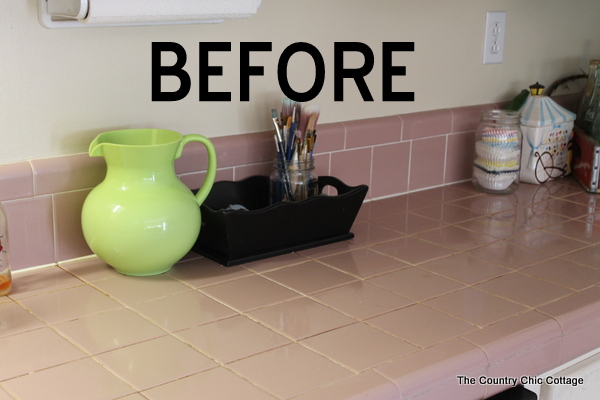
The grout gets disgusting. There’ s just no way around it! This is keeping it real y’all.
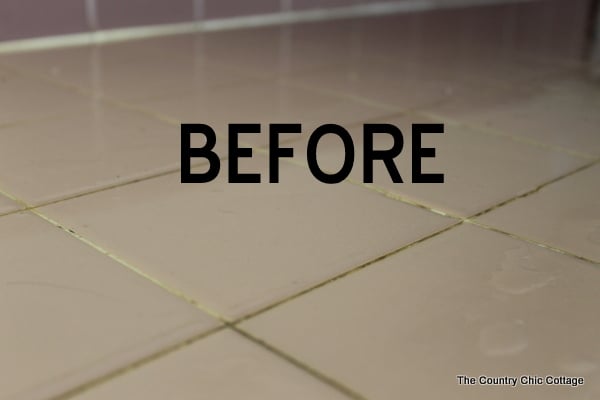
I soaked the area in vinegar and let it sit for 5 to 10 minutes. I then wiped off the area and scrubbed on the grout lines a little with a scrub sponge.
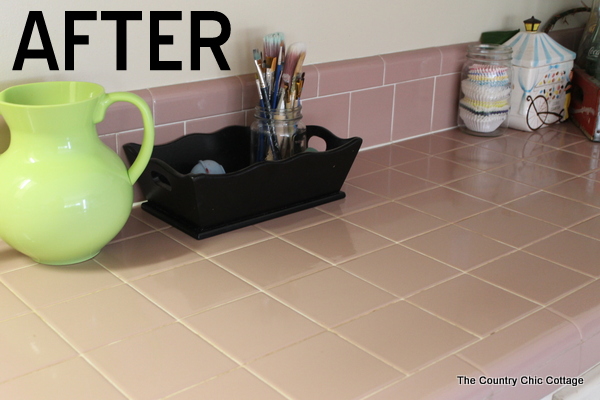
Oh, so much better! That’s the power of cleaning with vinegar in a real-life kitchen. Now those counters actually look like you would want to prepare food here!
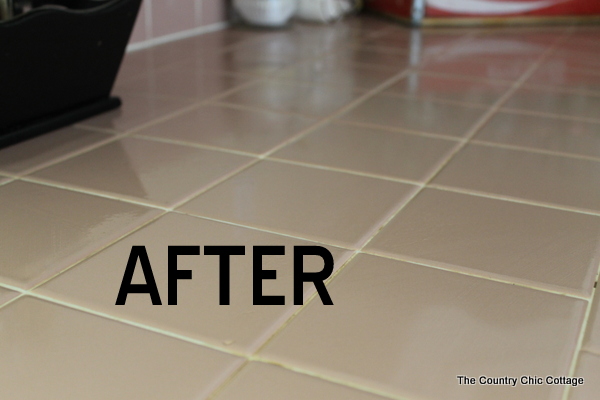
I hope that helps y’all to see just what vinegar can do for you – naturally! No need to worry about harsh chemicals when you use vinegar to clean.
Love Cleaning With Vinegar? Here Are More Natural Cleaning Ideas
For more cleaning and organizing printables, see our list of over 50 free cleaning and organizing printables.
NEW!!
Now you can print the complete guide to natural cleaning and keep it as a handy reference around your home. There are 225 ideas for using vinegar, cream of tartar, lemons, hydrogen peroxide, steam, baking soda, corn starch, salt, and rubbing alcohol to clean!
Yep, all of those things you probably have around your house already can be really powerful all-natural cleaners.
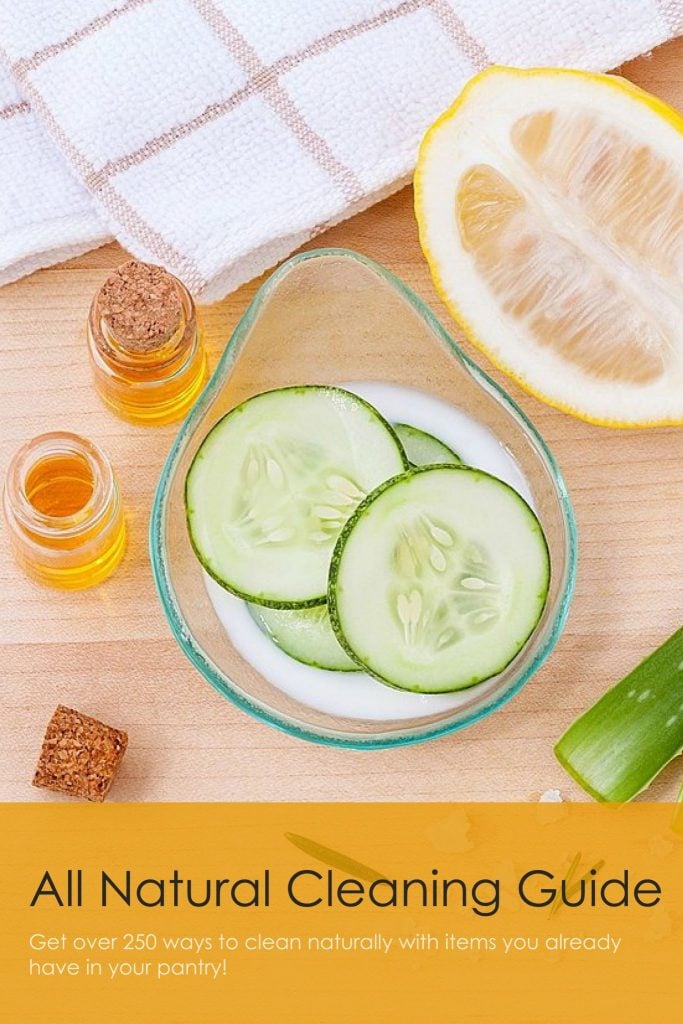
Just click here to add this download to your cart! Then, just download it to your computer. You can print it out with your home printer and keep it handy for all your natural cleaning needs all year long! I
have had many requests for a printable version of my cleaning series and this is the perfect time to release this series!
Looking for more genius hacks like cleaning with vinegar? Click here to see great genius ideas for your home!
Want to see my favorite cleaning supplies and products?
I have gathered all of the products I love using around my home into one great section of my Amazon storefront. You can click here to shop! If you’re looking for just about anything to clean your home, I probably have an option that you will love!

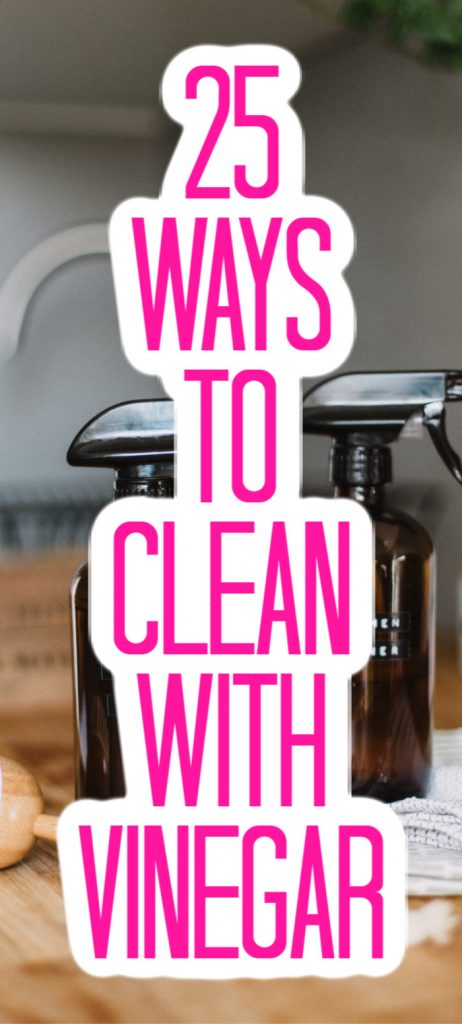
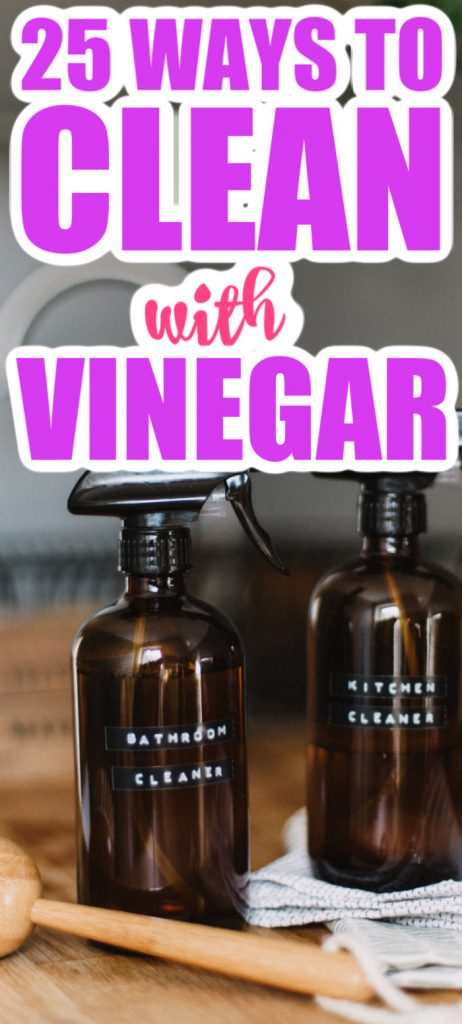
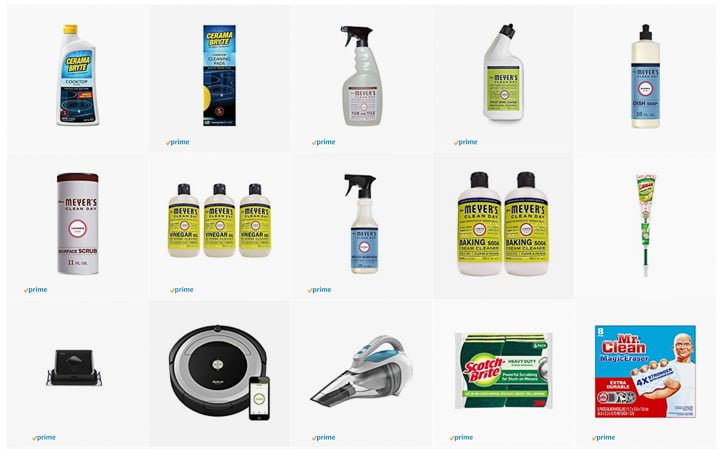










im curious… how are apple cider vinegar, white distilled vinegar and now cleaning vinegar different from each other? would any of them do the cleaning jobs as well as the other vinegars?? balsamic vinegar…etc?
im curious… how are apple cider vinegar, white distilled vinegar and now cleaning vinegar different from each other? would any of them do the cleaning jobs as well as the other vinegars?? balsamic vinegar…etc?
I wrap a paper towel at the base of the bathroom faucet pour enough vinegar to soak the paper towel and let it sit overnight. Lift off in the morning along with the gunk and discard
As an addition to the toilet cleaning, after soaking with vinegar add a spoon of baking soda. You’d be amazed what bubbles up from around the bend where you can’t get to with the brush.
I soak my shower head im hot vinegar for 5 min and then rinse clean I also wipe the soap scum from the inside of shower doors with a cloth and warm vinegar
Re #5 Dishwasher: Ever wonder if chemicals in rinse agents leave invisible residue? I did and stopped using it. Instead I fill reservoir with white vinegar! While I cannot see fill level, I add to point of overflow and refill at end of each week (depending on # of loads). Dishes come out squeaky clean, dishwasher insides look great and I save $$$$$. WIN!
My fav uses for vinegar is putting a cup of vinegar in your washing machine when washing musky smelling things such as towels, socks and underwear. I put it straight in with the load and it doesn’t leave a vinegar residue smell on the clothes at all.
The other way I love to use it is use it in place of the Jet Dry stuff that goes in the dishwasher to help dry dishes n keep the dishes from spotting. It smells a bit vinegary as the load is drying, (if you stand right above the dishwasher) but goes away when the load is done. The dishwasher stays smelling clean too.
I don’t like the smell of vinegar, so those are the ways I use it that you can’t really smell it. For cleaning I would use your vinegar recipes, but use rubbing alcohol in place of the vinegar n I usually add an essential oil with the alcohol n water all-purpose cleaner to help it smell even better.
Love your ideas!
Vinegar is also an excellent deodorizer- works fantastically on pet odors of ANY type; I also use it in the washer when doing pet laundry.
Had a pin for vinegar & canola oil to remove scratches from furniture, also darken wood around sinks & cabinets where varnish had started to wear off. lost measurements, can you help me? Works wonderfully!
Try this Phyllis:
http://www.hometalk.com/1578267/naturally-repair-wood-with-vinegar-and-canola-oil
Here’s one use you forgot! White vinegar gets rid of RUST! I soaked a pocketknife which had been lost outside all winter in a bowl of w.v. overnight. Before, i couldn’t even open the blades. In the morning, wearing gloves, I worked open the blades and let it soak again all day. I was amazed…no more rust! Remember to put a light coat of 3-in-1 oil on the metal as any coating the metal had is stripped away with the rust. Plus you don’t want the rust to reoccur.